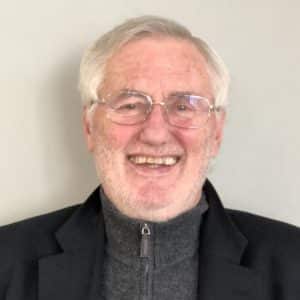
Why should Christians bother with the controversy swirling around Phil Mickelson and the PGA? What’s golf got to do with faith? Two words: riches and race. To better understand Phil Mickelson and other members of the PGA deciding to join the Saudi Arabia-backed professional golf tour I will look at two professional athletes and their treatment after controversial moments in their lives: Phil Mickelson and Colin Kaepernick.

Rodney Kennedy
There is always danger when professional athletes dare to enter the swirling conflicts of the political and social oceans that tend to produce more storms than the hurricane season in the Gulf of Mexico. The idea that well-paid athletes should play ball and keep their mouths shut often prevails. On September 22, 2017, President Trump described any National Football League (NFL) player who protested during the national anthem as a “son of a bitch” deserving to be fired. In response, during the broadcasts of the following games’ anthems, entire teams linked arms, knelt, or stayed in the locker room.
Scholars Shane M. Graber, Ever J. Figueroa, and Krishnan Vasudevan point out that “a particularly threatening form of athlete expression is activism against racism.” There is a “larger sports culture that reject[s] the infusion of racial politics into sports” which can be seen historically. Lew Alcindor, Jackie Robinson, and Muhammad Ali were all condemned at the time for their activism. More recently, the (then) St. Louis Rams were attacked and threatened for protesting Michael Brown’s death at the hands of the police. Sports leagues are built upon themes like faith in America or America as a meritocracy, but these ignore structural or systematic racism and racial prejudice. That isn’t to say that racism is completely denied, but even when the topic is taken up, it is usually done so in a superficial way.
Phil Mickelson – The Profit
Phil Mickelson represents white America – hot dogs, Chevrolet, and apple pie. Golf is mostly a white sport. Most PGA members are white. Tiger Woods is the exceptional exception. Kaepernick, like the majority of NFL players, is an African American professional athlete. Kaepernick is dissenting, protesting issues of racial injustice; Mickelson is not lodging a protest, he’s living the American dream of vast profit.
The issues in play on this rhetorical field are race, patriotism, civic virtue, the American flag, and money. I examine here the over-determined nature of money and the flag. How do they manage to outweigh the glaring injustices involved in racism?
The primal idols of America come out to play in this drama: money and the American flag. The backdrop for both idols is the ever-present issue of race. Mickelson has cover for his recent controversial move: he’s white and he’s chasing money. There’s no criticism that will stick in the mind of the average golf fan. While the PGA has suspended Mickelson and 16 other members, the decision was a business one and not an ethical one. When Mickelson played in the 2022 U. S. Open he was greeted by the fans with the usual adoration and acceptance, despite a poor performance. Mickelson has faced some criticism from sports writers and the PGA Tour commissioner, but overall his public reputation has been untarnished. When race and wealth are involved, the standards of acceptable civic rhetoric change according to the skin color of the dissenter.
There’s a sense that $200 million dollars, the amount Mickelson allegedly received from the Saudis, in this country, washes away all sins. The country’s horrific human rights record, the fact that most of the 9/11 hijackers were Saudis, and the murder of journalist Khashoggi didn’t produce outrage from fans or politicians. In America, money has become our gods. But is it the money that gives Mickelson cover or is it that he is white? I think it is some of both. Phil Mickelson and his fellow golfers are not protesting anything. They are doing the All-American shuffle: “Show me the money.” A nation addicted to dreams of winning the Mega-Lottery will not hold it against Mickelson for taking the money. A nation dominated by the desire to get rich will not be bothered by the lack of moral character in the people providing the money.
Families who lost loved ones on 9/11 sent Mickelson a letter. Their heartfelt response to Mickelson landed like the same appeals that the parents of children killed by mass shooters across our land. The appeal for some restrictions on guns has been stonewalled by Republicans and the money of the NRA is the big motivator. The letter sent by 9/11 Families United – a coalition of families and survivors of the 2001 terror attacks expressed their “outrage” at the players participating in “the multi-billion dollar ‘sports washing’ campaign.”

Steven Shircliff / Unsplash
In response, Mickelson appealed to his empathy. “I would say to the Strada family, I would say to everyone that has lost loved ones, lost friends on 9/11 that I have deep, deep empathy for them. I can’t emphasize that enough. I have the deepest of sympathy and empathy for them.” But $200 million is still $200 million.
We find it hard to work up much righteous indignation about greed. I am sure that none of us think we are greedy. We fail to grasp how “grasped” we are by money. Mickelson may be accused of greed, but we are unlikely to protest because we fail to see the greed that constitutes our greatest national transgression.
Making money is as American as it gets. It even seems downright patriotic. After all, we have embedded our patriotism and godliness on our money and in our national pledge. “In God we trust” and “one nation under God.” Phil Mickelson has all the cover he needs. His checks will not bounce. His reputation will not suffer. He is home free in the land of money.
Colin Kaepernick – The Protest
Colin Kaepernick played six seasons for the San Francisco 49ers in the National Football League (NFL). In 2016, he knelt during the national anthem at the start of NFL games in protest of police brutality and racial inequality in the United States. He was protesting racial injustice. The protest, with enough spin from conservatives, became a lack of patriotism.
Americans have a complicated relationship with dissent. Revolutionary War expert and historian Gordon Wood argues that the spirit of America is independent-minded individuals with a virtuous disrespect for authority. From the Boston Tea Party to David Ortiz saying at a Boston Red Sox game, “This is our f**king city,” disrespect for authority and dissent have always been part of America. The complicating factor is that not just anyone seems to be an acceptable bearer of the message of dissent.
This is particularly true for African Americans. Martin Luther King, Jr.’s condemnation of the war in Vietnam garnered him almost complete condemnation from U. S. daily newspapers, including the New York Times and the Washington Post. Jeremiah Wright’s bold sermon calling America to task for the sins of racism and nationalism almost derailed Barack Obama’s presidential bid. Wright had the audacity to attack the nation’s righteous opinion of itself. The sermon, though deeply rooted in scripture, Black liberation theology, and history, was mostly ignored by the media. Only one soundbite played endlessly for days on Fox News: “Not God bless America, but God damn America.” Criticizing America seems to be the imaginary line drawn in the sand, especially if the dissenters are African Americans.
Even David Brooks offers the cover of patriotism and national unity to dissuade high school football players from “pulling a Kaepernick.” Brooks implores, “We have a crisis of solidarity. That makes it hard to solve every other problem we have. When you stand and sing the national anthem, you are building a little solidarity, and you’re singing a radical song about a radical place.” Solidarity seems a bit of a stretch for a people so demeaned, mistreated, and discriminated against since the founding of this country. Brooks appeals to the power of the American civic religion and asks people to abide by its creed. This is, of course, the same creed that has made progress for American Americans so tortuous over the life of our nation. This is the creed that embraced first slavery and then segregation. This is the creed that is now used to silence dissent from Others.
Colin Kaepernick was exposed to charges of anti-patriotism. Patriotic ideals – the American flag, military, and National Anthem, in particular – were used to avoid any actual discussions on racism. In his case, protest itself became anti-patriotic. This reverses the founding principle of America: dissent from authority. In the short course of one decade, American colonists dispensed with the centuries-old patterns of deference, privilege, authority, and class structure that bound the world’s social order. Americans changed from being a go-along and get-along people deferring to kings to a people with a revolutionary spirit and a heart-filled explosion of dissent. Kaepernick wasn’t being anti-patriotic, he was being a true American – an independent person addressing grievances that deserved a fair hearing in the court of public opinion. Yet from Donald Trump to the American press to the public, Kaepernick became “enemy #1.”
The public, by and large, found Kaepernick’s actions disrespectful of United States patriotism, specifically the flag, military, and the national anthem itself. This is despite the fact that he chose to take a knee instead of sitting down as deliberate a sign of respect at the urging of retired Green Beret Nate Boyer. And Kaepernick insisted in numerous interviews that he held patriotism in high regard. Two days after the media first reported his protest, he sat in front of his locker answering the media’s questions for eighteen minutes, an especially long time for a locker room interview. Said Kaepernick: “I have great respect for the men and women that have fought for this country. I have family, I have friends that have gone and fought for this country. And they fight for freedom, they fight for the people, they fight for liberty and justice, for everyone.”
The vocabulary that helps mask racism contains words of patriotism and faith. These are deeply emotional words like salute, respect, stand up, stand united, the flag, men and women in uniform, law enforcement, “Judeo-Christian” values – and dignity. This dictionary of dignity reflects a set of swelling ideas and images, which resonate with conservatives as material manifestations of pride. These are the triggers for white defiance. There’s a sneering explosion: “How dare they call me a racist.” The attack on Colin Kaepernick is an example of this rhetorical strategy of opposing charges of racism with patriotism.
A professional athlete taking millions of dollars from a nation with a dismal human rights record and the blood of a journalist on their hands is seen as nothing more than making money. Mickelson is a good American, a good white boy living the American dream.
Another professional athlete lodging a thoughtful protest is deemed unpatriotic and even traitorous. Colin Kaepernick has been unemployed by the NFL for six years. He has been branded a traitor. The twin sisters of delusion, race and riches, both played defining roles in how the drama played out.
This injustice should matter to all of us, especially Christians.
Rodney Kennedy has his M.Div. from New Orleans Theological Seminary and his Ph.D. in Rhetoric from Louisiana State University. The pastor of 7 Southern Baptist churches over the course of 20 years, he pastored the First Baptist Church of Dayton, Ohio – which is an American Baptist Church – for 13 years. He is currently professor of homiletics at Palmer Theological Seminary, and interim pastor of Emmanuel Friedens Federated Church, Schenectady, New York. His sixth book – The Immaculate Mistake: How Evangelicals Gave Birth to Donald Trump – is now out from Wipf and Stock (Cascades).






